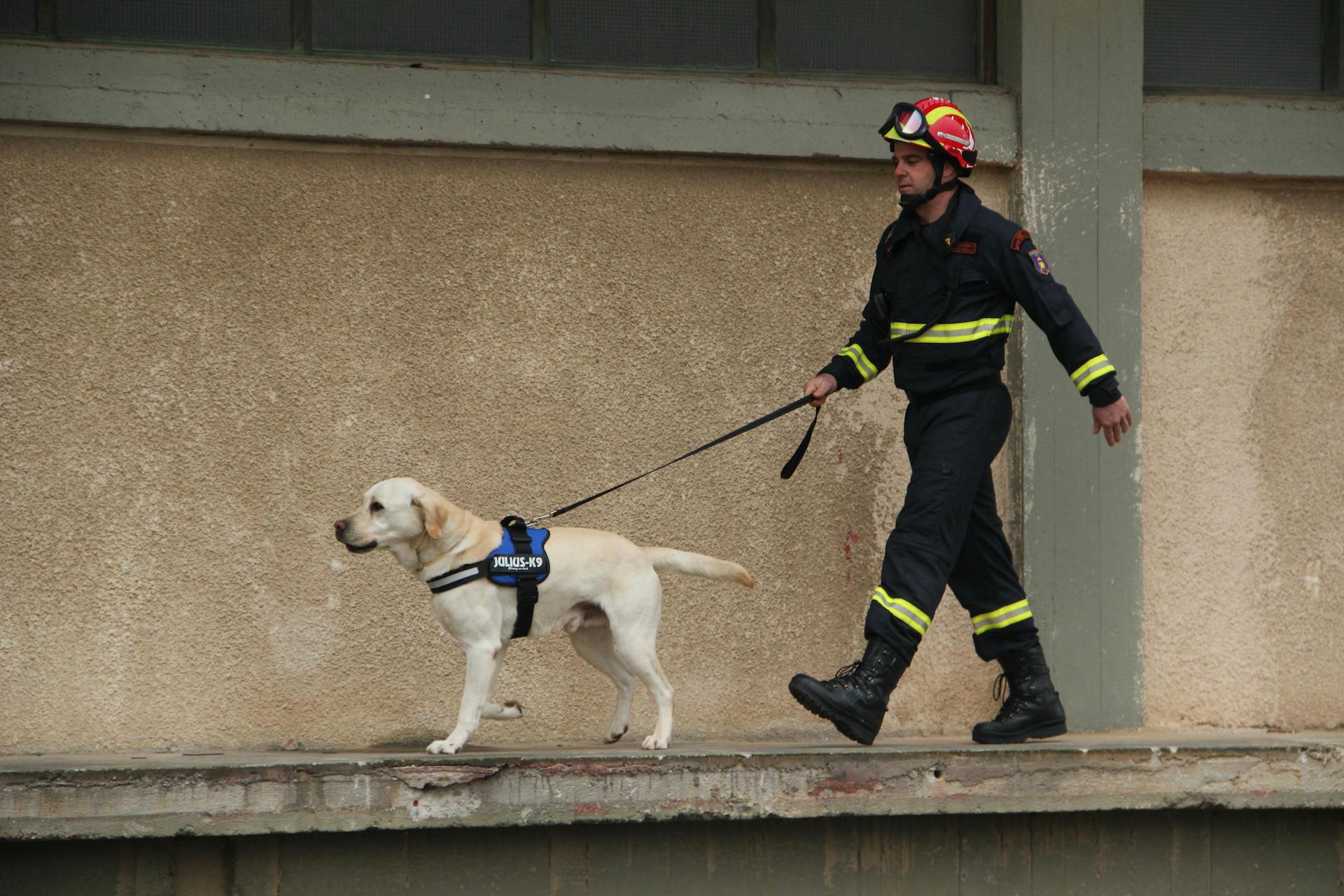
In many countries, service dogs are recognized and allowed to accompany their owners in public places. Canada is one of them, where service animals are protected under the Canadian Human Rights Act.
In the United States, service dogs are also widely accepted, with laws in place to ensure their accessibility in public spaces. Service dogs are allowed in restaurants, hotels, and public transportation.
Australia is another country where service dogs are recognized and allowed, with laws in place to protect the rights of people with disabilities. Service dogs are permitted in shopping centers, restaurants, and public transportation.
In the UK, service dogs are allowed in most public places, including restaurants, shops, and public transportation, as long as they are properly identified and behave well.
A different take: Laws about Service Dogs in Training
Countries with Service Dog Laws
Countries with Service Dog Laws are actually quite welcoming, and I'm happy to share some specifics. The United Kingdom, for instance, has the Equality Act of 2010, which prohibits discrimination against individuals with disabilities and their assistance dogs.

In the UK, assistance dogs are allowed in all public places, including restaurants, shops, and public transportation. France, Germany, and Italy also have similar laws, requiring that assistance dogs be on a leash and have proof of vaccinations.
Many European countries have established legal protections for assistance dogs and their handlers, including the right of access to public spaces and transportation. This means that service dog owners can travel freely throughout these countries with their assistance animals.
Here's a breakdown of some key regulations in popular European countries:
It's worth noting that many European countries require that assistance dogs receive specialized training to ensure they can perform the tasks required to assist their handlers. This typically involves extensive training in obedience, task-specific skills, and public access manners.
Traveling with Service Dogs
Traveling with service dogs can be a bit of a challenge, but knowing the rules and regulations can make a big difference.

If you're planning to travel internationally with your service dog, there are 10 steps you can follow to ensure a smooth journey. These steps can be found in the article section "Traveling Internationally with a Guide Dog or Service Animal".
In Europe, assistance dogs are protected under the European Union's Equality Directive and the United Nations Convention on the Rights of Persons with Disabilities.
Many European countries have established legal protections for assistance dogs and their handlers, including the right of access to public spaces and transportation.
The specific training requirements for assistance dogs vary depending on the type of assistance dog, but typically involve extensive training in obedience, task-specific skills, and public access manners.
In the United Kingdom, the Equality Act of 2010 prohibits discrimination against individuals with disabilities and their assistance dogs. Assistance dogs are allowed in all public places, including restaurants, shops, and public transportation.
Here's a breakdown of the key regulations in popular European countries:
Most European countries require that assistance dogs be certified by a recognized organization or trainer to ensure they meet the necessary training and behavior standards.
Editor's Choice

In the UK, the Equality Act 2010 provides legal protection for assistance dogs, including those for people with disabilities and mental health conditions. This means that assistance dogs are allowed in most public places.
The UK has a specific law regarding assistance dogs, which is the Equality Act 2010. This law requires businesses and organizations to allow assistance dogs in their premises.
If you're unsure whether a dog is a legitimate assistance dog, look out for the distinctive harness or jacket that assistance dogs wear in the UK. These dogs are trained to assist people with a range of conditions, from physical disabilities to mental health conditions.
Some common types of assistance dogs include psychiatric assistance dogs, which help people with anxiety and panic attacks. These dogs are trained to provide emotional support and comfort in times of crisis.
Here are some key facts about assistance dogs in the UK:
The UK has a system in place to spot fake assistance dogs, which can be a problem in some cases. If you're unsure whether a dog is a legitimate assistance dog, it's best to ask the owner politely if you can approach the dog.
Frequently Asked Questions
What dog breeds Cannot be service dogs?
No dog breed is inherently ineligible to be a service animal, regardless of breed-specific laws or bans. Service animals are protected under the law and cannot be excluded due to breed.
Sources
- https://www.servicedogcertifications.org/international-travel-service-dog/
- https://www.servicedogcertifications.org/guide-for-traveling-with-a-service-dog-in-europe/
- https://www.miusa.org/resource/tip-sheets/10steps/
- https://uksupportdog.com/blog/assistance-dog-laws-in-europe
- https://www.servicedogtrainingschool.org/service-dog-legalities
Featured Images: pexels.com

